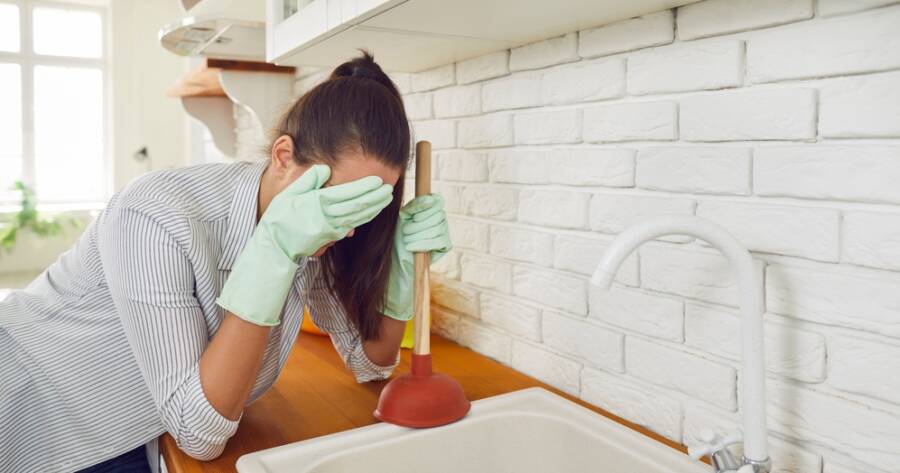Clogged drains can quickly turn into a nightmare, but with a few simple tricks, you can keep them flowing smoothly. Discover the best ways to prevent buildup, tackle tough clogs, and avoid costly plumbing bills by mastering these essential drain cleaning tips!
Plunge Away Blockages
A plunger is one of the simplest yet most effective tools for clearing blocked drains. It works by creating suction and pressure that can dislodge the blockage, allowing water to flow freely again.
To use it effectively, ensure the plunger forms a tight seal over the drain, then plunge vigorously for a few seconds. This method is particularly useful for sinks, showers, and toilets. For optimal results, use a bellows-style plunger designed for more powerful plunging, and always keep a separate plunger for toilets for hygiene reasons.
Baking Soda and Vinegar: A Powerful Combo
Baking soda and vinegar are a popular, eco-friendly solution for drain cleaning. The chemical reaction between these two substances creates a fizz that helps break up clogs caused by grease, soap scum, or hair.
Start by pouring 1/2 cup of baking soda into the drain, followed by 1/2 cup of vinegar. Cover the drain to allow the mixture to work for about 15 minutes. Afterwards, flush with boiling water to clear the loosened debris. This method is both safe for pipes and septic systems, making it a great option for regular drain maintenance.
Boiling Water: Simple Yet Effective
Boiling water is another effective, chemical-free way to clear minor clogs, particularly those caused by grease or soap buildup. Boil a large pot of water and carefully pour it down the drain in stages, allowing each pour to sit for a few moments before adding more.
The intense heat can dissolve buildup and restore flow. However, avoid using boiling water on PVC pipes, as extreme heat could cause damage. This method works best as a preventative measure, ensuring grease and soap scum don’t accumulate over time.
Use a Wire Hanger for Stubborn Hair
A simple wire coat hanger can become a handy drain-cleaning tool. To use, straighten the hanger and bend one end into a small hook. Carefully insert the hooked end into the drain and fish out hair, gunk, and other debris causing the blockage.
This technique is especially effective for removing hair clogs from shower or bathtub drains. Once you’ve pulled out as much debris as possible, flush the drain with hot water to ensure everything is cleared. This DIY method works well for shallow clogs and is a great alternative to chemical cleaners.
Lemon and Ice for Garbage Disposal Odors
If your kitchen sink emits unpleasant odors, your garbage disposal may be the culprit. To clean it, fill the disposal with ice cubes, a handful of coarse salt, and a few lemon peels. Run the disposal while grinding this mixture to remove built-up grease and food particles, leaving your sink smelling fresh.
The ice sharpens the blades, the salt acts as an abrasive, and the lemon adds a pleasant scent while breaking down food residues. Regularly cleaning your garbage disposal using this method can prevent future clogs and ensure it operates smoothly.
Prevent Clogs with Biological Cleaners
Biological drain cleaners use natural enzymes to break down organic material in drains, preventing clogs from forming. These cleaners are safe for the environment and gentle on your plumbing, making them a great alternative to harsh chemical drain cleaners.
For best results, apply the biological cleaner according to the product’s instructions, usually once a month. This regular treatment can keep your drains clear of buildup and smelling fresh. While these cleaners may take longer to show results compared to chemical products, they are much safer for both your pipes and septic system.
When to Call a Professional
Sometimes DIY methods may not be enough to clear a persistent or severe clog. If water is backing up, multiple drains are slow, or strange odours are coming from your pipes, it’s time to call a professional plumber.
A plumber has the tools and expertise to address deeper issues like tree roots in pipes, sewer line blockages, or stubborn grease clogs. Additionally, if your DIY efforts haven’t solved the problem or if your drains clog frequently, professional intervention can prevent more serious damage to your plumbing system.
Learn More About Drain Cleaning Tips & Tricks
Regular drain maintenance can save you from the headache of costly repairs and persistent clogs. By applying these simple tips—like using a plunger, baking soda and vinegar, or even a wire hanger—you can keep your drains flowing smoothly. Incorporating preventative measures such as biological cleaners and regular cleaning of your garbage disposal will help prevent buildup and odours.
However, if you encounter more serious clogs, knowing when to call a professional is key. For more in-depth advice and tips on drain cleaning, explore additional resources to ensure your plumbing remains in top condition.
